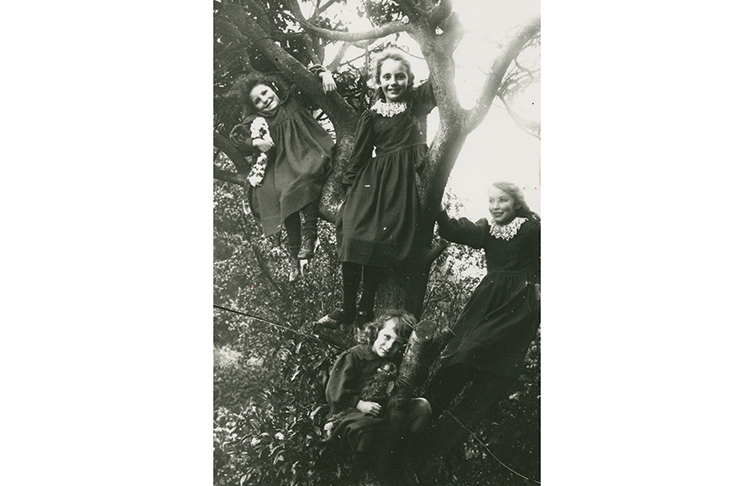It was high time we had a proper look at the four beautiful, original Olivier sisters. Hitherto, with one exception, they have been seen in glimpses, playing marginal parts on the Bloomsbury stage after about 1910. The exception was the youngest, Noel, who all her life and since has been stuck with her invidious role as the girl who turned down a national hero, Rupert Brooke. Even Sarah Watling cannot help beginning and ending her solid, thoughtful book with that piece of the jigsaw. But admirably, if a trifle laboriously, she goes on to consider each of them as an individual, and succeeds in placing them firmly in the vanguard of the slow progress of women towards a measure of personal and professional freedom.
Their lives were not plain sailing. In some ways, this could even be seen as a cautionary tale: progress usually comes at a cost. Margery, Brynhild, Daphne and Noel, the four daughters of Sydney and Margaret Olivier, late-Victorian parents turned Fabian socialists, were considered by their contemporaries an alarming bunch. Born between 1886 and 1892, they grew up in the wooded hills around Limpsfield, Surrey, then still relatively untamed countryside, presided over by the literary Garnett family and known as Dostoevsky Corner — Constance Garnett being the first great translator of the Russian classics. The girls climbed trees in their blue serge knickers, swam in the muddy streams, built huts and tree houses, made fires and skinned rabbits. One of their playmates was Constance’s son David, always known as Bunny; they may not have skinned him but they unnerved him. It was he who later called them ‘cruel as savages’ and ‘ruthless Valkyries’ — perhaps because none of them was among his many conquests. Their nanny wondered ‘if all socialist infants are so exhausting’.
Encouraged to run wild, and separated from their parents for long periods while Sir Sydney, as he later became, went off to govern Jamaica, the girls formed close bonds, though sisterhood could be competitive and demanding. They grew up serious-minded, emotionally intense, disinclined to be dominated by men and intending to make a mark. Margery, the eldest, was clever, protective, an active Fabian but emotionally fragile. Luckily they were almost equally good-looking, though Brynhild, the artistic one who designed jewellery, was the most classically beautiful. Daphne, who helped to bring Steiner education to Britain, was idealistic and unworldly. Noel, the youngest, was the most self-contained and the fiercest.
At a time when education was still regarded as bad for the female reproductive system, they were lucky enough to have parents of advanced ideas who thought otherwise, sending them variously to Bedales, where girls and boys were taught together, and naked swimming approved, to Cambridge, where they could study but not take degrees, and, in Noel’s case, to medical school: she set her heart early on becoming a doctor, and succeeded.
Their impact on the boys and young men they met at Bedales, at university or at Fabian Society gatherings was dramatic. They were naturally soon caught up with what was not yet established as the Bloomsbury group, the Cambridge-based circle which, despite the inclusion of the Stephen sisters, Virginia and Vanessa, was fundamentally homoerotic, taking its tune from Lytton Strachey and his admirers. Female sexuality was confusing and threatening; Rupert Brooke’s idea of a compliment to Noel Olivier was to praise her mind for being ‘clean and clear like a man’s’; and when James Strachey, Lytton’s brother, who himself fell for Brooke, went on to fall for Noel, he was berated for risking male friendship for ‘a creature with a cunt’.
It was Virginia Woolf, always beady-eyed, who around 1910 named the Oliviers the Neo-Pagans; she, along with Lytton, recoiled from their hearty, outdoor activities, the summer camps at Grantchester or on the Hamble river, where there was much naked bathing and sleeping side by side in hay fields under the stars. Sex was, however, mostly sublimated in earnest talk, even though Rupert Brooke sometimes emerged from a dive with an erection, and Bunny Garnett was much moved by the girls’ smooth bare shoulders, soft skin and flowing hair.
It was the sisters’ opportunity, but also perhaps their misfortune, to represent the New Woman, whose efforts to break free from stifling conventions could make her vulnerable. Margery, after a narrow escape from a traditional marriage and an obsession with a male lover of Lytton’s who did not want her, had a schizophrenic breakdown from which she never recovered. Watling gives a disquieting account of the inadequate care on offer for women with mental health problems.
The other sisters all eventually married and had children. The lovely Brynhild caused consternation by leaving her husband for another man, struggled financially and died young. Noel, who had the good sense not to succumb to Rupert Brooke (whose sexual confusion led to a severe breakdown of his own), made a stable marriage to another doctor. She steadfastly refused to hand over her Brooke love letters to a succession of avid biographers after the publication of his poems and his death on a Greek island in 1915 made him into a romantic hero. Watling rather admires her for this refusal to be grist for the biographical mill.
Golden lads and girls they once were; but Watling’s sympathetic and conscientiously researched book reveals the darker side of their story.






Comments